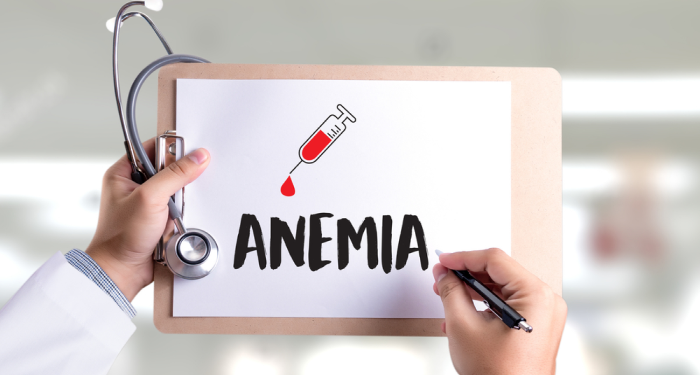Anemia - Symptoms, Causes, Treatment & Types
Written By: Dr. Shaza Mohammed
Updated On:December 20, 2023

What is Anemia?
Anemia is a medical condition that is caused by a lack of healthy red blood cells in the body. This lack of healthy red blood cells leads to a lack of oxygen being carried to your body’s tissues; causing weakness & fatigue.
There are many types of anemia. The condition is commonly caused by an iron deficiency but can also occur when there is a loss of blood, during pregnancy, certain medication, after surgery, or by gastrointestinal conditions.
What are the symptoms of Anemia?
Some of the symptoms of anemia include:
- Weakness
- Tiredness
- Dizziness
- Chest pain
- Brittle nails
- Unusually pale skin
- Cold hands & feet
- Inflamed or sore tongue
- A craving for unusual substances (ice, starch, etc)
Does anemia affect both men & women?
Women are twice as likely to experience anemia than men. Women may experience anemia in the second & third trimester of their pregnancy. This is usually managed with iron-rich diet adjustments or supplements.
Anemia in men is rare. If it does occur, it tends to affect boys under the age of five & men over 65 years old. Anemia is likely to affect men that do not get enough iron from their daily diet, although this does not tend to happen.
What are the different types of Anemia?
There are more than 400 different types of anemia. These types of anemia are categorised under three main causes: Blood loss, decreased or faulty red blood cell production, & the destruction of red blood cells.
The most common cases of anemia we see are:
- Sickle cell anemia
- Hemolytic anemia
- Pernicious anemia
- Iron deficiency anemia
- Pregnancy induced anemia
Causes of Anemia
There are a range of types of anemia caused by a variety of factors. Anemia happens when there isn’t enough red blood cells in the body. This happens when:
- The body doesn’t make enough red blood cells.
- Bleeding results in red blood cells loss more than they can be replaced.
- The body destroys red blood cells.
Risk Factors
The following factors could increase the risk of anemia:
- Infections
- Chronic conditions: like cancer, kidney failure, diabetes or any other chronic condition as they could lead to a shortage of red blood cells
- Pregnancy
- Menstruation
- Intestinal disorders
- Age: People above the age of 65 are at higher risk of anemia
- Genetic factors
- Iron deficiency
- Immune system disorders
- Low red blood cell production in the body
- Excessive bleeding causing a loss of red blood cells
Causes of Sickle Cell Anemia:
Sickle cell anemia is genetic. It is caused by a defective form of hemoglobin that forces red blood cells to assume an abnormal crescent (sickle) shape.This irregular blood cell tends to die prematurely, resulting in a chronic shortage of red blood cells. Sickle cell anemia is prevalent in people of Middle Eastern, Asian, Indian, African, & Mediterranean descent.
Causes of Hemolytic Anemia:
Hemolytic anemia is caused by the destruction of red blood cells. It can be a condition that occurs from sickle cell disease. Hemolytic anemia is also caused by infections, toxins from advanced liver or kidney disease, immune system disorders, severe hypertension, tumors, prosthetic heart valves, disorders related to blood clots, & exposure to certain chemicals or foods.
Causes of Pernicious Anemia:
Pernicious anemia is caused by the body’s inability to produce a substance in the stomach called the intrinsic factor. Pernicious anemia also leads to a deficiency of vitamin B12 as it blocks the small intestine from absorbing this necessary vitamin. Pernicious anemia is an autoimmune condition (typically caused by immune system complications) & those affected by it often require lifelong medication to help manage their symptoms.
Causes of Iron Deficiency Anemia:
A leading cause of iron deficiency anemia is a lack of adequate iron in a person’s diet. Iron deficiency anemia can also be caused by long-term blood loss. Medical conditions like a peptic ulcer, hiatal hernia, polyp, & gastrointestinal bleeding can lead to this type of anemia. Iron deficiency anemia is curable; but requires taking iron supplements & making dietary changes over the course of several months to replenish the body’s iron levels.
Causes of Pregnancy Induced Anemia:
Anemia during pregnancy can be caused by insufficient iron or folate to support you & your growing baby’s bodily needs. Pregnancy induced anemia tends to occur during the second or third trimester as your body struggles to produce a healthy amount of red blood cells for both you & your baby. Pregnancy induced anemia is temporary & dissipates soon after your baby is born. Common treatments for pregnancy induced anemia includes iron supplements & eating more foods that are rich in iron & folate. It is highly recommended to consult your doctor before taking action.
Below are the factors can increase your risk of developing anemia:
- Lack of Iron In Your Diet: A long-term diet that is low in iron, B12, & folate can lead to anemia. A balanced diet rich in leafy vegetables is advised.
- Genetic Factors: Some types of inherited anemia, like sickle cell anemia, is more prevalent in people of Middle Eastern, Asian, Indian, African, & Mediterranean descent.
- Menstruation: Menstruation can cause a loss of red blood cells. A significant lack of red blood cells over a period of time can lead to anemia.
- Pregnancy: Anemia during pregnancy can be caused by insufficient iron or folate to support your & your growing baby’s bodily needs.
- Chronic Conditions: Chronic conditions like diabetes, hypertension, cancer, or kidney failure & a compromised immune system can lead to a loss of red blood cells. This can increase your chances of developing anemia.
- Surgery: Post-surgery infections or prosthetic heart valves can cause anemia.
- Medical Disorders: Immune system disorders & disorders related to blood clots can heighten a person’s chances of getting anemia. Some people have an inability to produce a substance in the stomach called the intrinsic factor, this interferes with the body’s B12 absorption, leading to anemia.
Complications of Anemia
Anemia can lead to some long-term health complications including:
- Depression: This is one of the multiple cognitive impacts anemia can have on the brain. Others include anxiety, irritability, & disrupted concentration.
- Long-Term Tiredness: The lack of healthy red blood cells to carry oxygen to your body’s tissues leads to anemia-related fatigue & weakness.
- Heart Complications: Anemia can cause cardiac stress & lead to an irregularly fast heartbeat, a higher risk of stroke, & heart failure.
- Heightened Risk Of Infections: Anemia can take a toll on your immune system & blood circulation, leading to a greater risk of infections.
- Premature Birth: Maternal anemia developed in the first trimester can lead to a premature birth. However, pregnancy-induced anemia developed in the second & third trimester are less likely to result in a premature delivery.
When should you see a doctor for Anemia?
While weakness & tiredness are common symptoms of anemia, it is always recommended to consult your doctor before taking medication or supplements. In some cases, while your body may be showing symptoms of anemia, it could be caused by another underlying condition that may need medical attention. You should see a doctor if you are experiencing:
- Troubled breathing
- A change in heartbeat
- Unusually heavy periods
- Consistent tiredness or weakness
- Sudden symptoms that are interfering with your everyday life
Treatment of Anemia
What food should I eat to treat anemia?
- Iron: Food rich in iron is recommended to treat anemia caused by iron deficiencies. Dark green leafy vegetables, beans, nuts & seeds, & foods fortified with iron are recommended for vegans, vegetarians, & omnivores.
- Lean Meat: Omnivores are advised to eat poultry, fish, & lean red meat.
- Vitamin C: Foods rich in vitamin C should also be eaten alongside these recommended foods to increase the body’s absorption of nonheme iron.
What food should I avoid to treat Anemia?
Avoid foods high in phytate. Phytic acid blends with iron in the digestive tract; & inhibits the body’s absorption of iron. Foods containing phytates are legumes, whole grains, brown rice, gluten-rich foods, & certain kinds of nuts.
Dietary changes should be made mindfully. As an imbalanced diet can lead to discomfort & deficiencies, it is wise to always consult your doctor before making significant lifestyle changes. Consult a Medcare expert today.
Below is some more information on treatment of Anemia:
- Iron Deficiency Anemia Treatment: Iron deficiency anemia can be overcome over the course of a few months with a diet rich in iron, vitamin B12, folate, & iron supplements.
- Sickle Cell Anemia Treatment: Sickle cell anemia symptoms can be managed with the help of a doctor or a medical professional. Disease management & treatment can include prescribed medication, blood transfusion, or a stem cell transplant.
- Hemolytic Anemia Treatment: Hemolytic anemia can be managed & treated with prescribed medication, blood transfusions, stem cell transplants, lifestyle adjustments, & surgery.
- Pernicious Anemia Treatment: Pernicious anemia can be treated by adding more foods rich in B12 to your diet like salmon, dairy, & eggs, B12 supplements, or a course of B12 injections including hydroxocobalamin & cyanocobalamin.
- Pregnancy Induced Anemia Treatment: Anemia during the second & third trimester of pregnancy is normal & can be managed with iron & folate supplements. Diet changes to incorporate lean meat & dark leafy vegetables will also benefit you. Pregnancy induced anemia usually goes away on its own after birth.
Prevention of Anemia
- Lifestyle awareness : An awareness of healthy eating, supplements for vegetarians & vegans, & knowledge about your family’s medical history are some proactive steps you can take to avoid or predict your likelihood of developing genetic anemia.
- Balanced diet rich in iron, B12, & folate : Consuming a sufficient amount of dark leafy greens, iron-rich lean meat, seafood, eggs, & supplements (for plant-based diets) will prevent anemia.
- Observing your body during pregnancy : Dizziness & tiredness are common during pregnancy but if these symptoms are interfering with your daily life; consult your doctor. Diet changes & supplements can help manage anemia during pregnancy.
Your health is at the heart of what we do. Our experts are always an appointment away to guide you through the right treatment plan.
Meet our doctors from the Family Medicine department





























